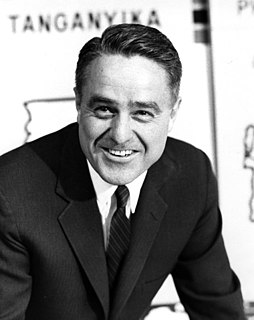A Quote by Steven Pinker
The human capacity for compassion is not a reflex that is triggered automatically by the presence of another living thing.
Related Quotes
It all stems from the same thing - which is that when we are face to face - and this is what I think is so ironic about Facebook being called Facebook, because we are not face to face on Facebook ... when we are face to face, we are inhibited by the presence of the other. We are inhibited from aggression by the presence of another face, another person. We're aware that we're with a human being. On the Internet, we are disinhibited from taking into full account that we are in the presence of another human being.
Thought reflexes get conditioned very strongly, and they are very hard to change. And the also interfere. A reflex may connect to the endorphins and produce an impulse to hold that whole pattern forther. In other words, it produces a defensive reflex. Not merely is it stuck because it's chemically so well built up, but also there is a defensive reflex which defends against evidence which might weaken it. Thus it all happens, one reflex after another after another. It's just a vast system of reflexes. And they form a 'structure' as they get more rigid.
It is my fundamental conviction that compassion - the natural capacity of the human heart to feel concern for and connection with another human being - constitutes a basic aspect of our nature shared by all human beings, as well as being the foundation of our happiness. All ethical teachings, whether religious or nonreligious, aim to nurture this innate and precious quality, to develop it and to perfect it.
Compassion arises naturally as the quivering of the heart in the face of pain, ours and another's. True compassion is not limited by the separateness of pity, nor by the fear of being overwhelmed. When we come to rest in the great heart of compassion, we discover a capacity to bear witness to, suffer with, and hold dear with our own vulnerable heart the sorrows and beauties of the world.
I believe in recognizing every human being as a human being--neither white, black, brown, or red; and when you are dealing with humanity as a family there's no question of integration or intermarriage. It's just one human being marrying another human being or one human being living around and with another human being.
Man is capable of greatness, love, nobility, compassion. Yet never forget that his capacity for evil is infinite. It is a sad truth, boy, that if you sit now and think of the worst tortures that could ever be inflicted on another human being, they will already have been practiced somewhere. If there is one sound that follows the march of humanity, it is the scream.
After all, I quite naturally want to live in order to fulfill my whole capacity for living, and not in order to fulfill my reasoning capacity alone, which is no more than some one-twentieth of my capacity for living. What does reason know? It knows only what it has managed to learn (and it may never learn anything else; that isn't very reassuring, but why not admit it?), while human nature acts as a complete entity, with all that is in it, consciously or unconsciously; and though it may be wrong, it's nevertheless alive.
Peace is a condition of the heart. It's a state of mind, of tranquility, of calmness, and of centeredness. It's an understanding of the reciprocal nature of love, a presence, a journey. It's all of our aspirations. Peace is not a luxury or merely the absence of war, it's a kind of grace - which we're all entitled to as people who are alive. Peace is an active presence of the capacity for a higher evolution of human awareness.




































